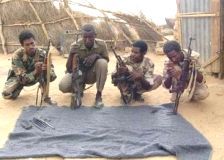Eastern rebels threaten new troubles in Sudan
By Ed Harris
HAMESH KOREB, Sudan, June 13 (Reuters) – A group of unshaven, uniformed men squat on a dusty floor, drinking coffee and talking softly, inured to the din of a dawn chorus and the occasional braying of a donkey.

|
|
Beja rebels strip their rifles on a rocky hill near the Eritrean border town of Rubda June 4, 2005. (Reuters). |
The men have recently returned from kidnapping six Sudanese officials and are now relaxing in Hamesh Koreb — a simple sprawl of mud buildings in eastern Sudan and the largest town in territory held by the rebel Beja Congress Army.
“We attacked the road to capture government soldiers and show them we are a force,” said Ali Hamed, a rebel company commander dressed in tunic and sandals.
“We are ready to fight against the government until we get justice and equality in Sudan,” he added.
Like better-known rebel groups in the western Sudanese region of Darfur, the Beja are angry about the lack of development in their homeland and accuse the central government in Khartoum of marginalising them.
The Beja rebels have held a small territory — around 15,000 square miles (40,000 sq km) — since 1997. Now they are threatening to step up attacks after a lull in large-scale activities since 2002.
“NEXT CIVIL WAR”?
That has fuelled fears the Beja region could become the next flare-up in Africa’s largest country, where conflicts in the south and west have brought international condemnation.
The situation “requires proactive efforts to deal with the explosive situation in the eastern part of the country before it becomes the next major civil war,” Brussels-based conflict experts the International Crisis Group warned in April.
Khartoum is eager to prevent an escalation of hostilities in the east, not least since a 20-year war in the south was settled in January and because the government remains under intense international pressure to resolve the Darfur conflict.
The Sudanese government recently promised more aid and infrastructure rebuilding for the east.
But the Beja — a traditionally nomadic people of several million inhabiting Egypt, Sudan and Eritrea — say Khartoum understands nothing but force.
Recent events in the eastern Red Sea town of Port Sudan have fed their anger. Sudanese forces killed at least 20 people there in January in a crackdown on Beja demonstrations to demand talks on sharing power and wealth.
Sudan’s main oil pipeline runs from oil-producing areas in the centre of the country to Port Sudan, making the region vital to the country’s burgeoning energy industry.
“You cannot say that we are ambitious. These are our rights,” said Mousa Mohamed, chairman of the Eastern Front on a rocky rise not far from the Eritrean border town of Rubda.
The Eastern Front was formed in February when two Beja groups, the Beja Congress and Rashaida Free Lions merged.
“In a country which has been independent for over 50 years, such a situation is a disgrace,” Mohamed said, referring to the daily hardships of the region’s people.
“In the past, the people of eastern Sudan have been begging for their rights, and this is why we have taken up arms.”
Sudan gained formal independence from Britain in 1956.
Once part of the opposition umbrella group alliance talks in Cairo with the Khartoum government, the Eastern Front has now rejected full participation in the negotiations.
Mousa refused to say how many troops he had at his disposal.
SOUTHERN REBELS MOVE OUT
The balance of power in the region is slowly shifting.
Southern rebel forces had taken refuge there and supported the Beja, but under a recent peace agreement, the Sudan People’s Liberation Army (SPLA) must now leave the area by mid-January.
They are gradually leaving their clusters of thatch huts to the wind and swirls of dust.
On a warm evening in Rubda, where dust in the sky obscures the setting sun, a senior SPLA officer offers a mug of water to his thirsty visitors and voices hopes for the Beja.
Until the withdrawal is complete, however, the SPLA presence is keenly felt. But Mousa insisted the Beja were prepared for a long struggle alone and hailed the SPLA as an example.
“They believed in their rights,” he said.
But while southern rebels seem happy to go home after many years in the east, newly arrived rebels from Darfur’s Justice and Equality Movement (JEM) are posing for photographs in Rubda and putting on a show of solidarity among active insurgents.
“The situation is volatile,” Mousa said.
